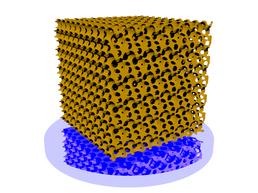Computational electromagnetic modelling of 3D photonic structures
- Homepage
- http://www.soton.ac.uk/ses/research/engmats/projects/project027.html
- Research Team
- Asa Asadollahbaik, Elizabeth Hart
- Investigators
- Marc Molinari, Darren Bagnall, Simon Cox

Periodic structures such as the inverse opal can produce unexpected and new effects in light reflection and transmission when small changes are made to the parameters defining the lattice structure.
Nano-structured materials can provide very specific and often very special optical effects which can be exploited for a large range of optical applications including wavelength filters, LEDs, micro-lasers, HDTV, solar-cell coatings, optical high-Q fibres, diffraction gratings, polarisation devices, optical switches, etc. This research in “Computational Electromagnetic Modelling of 3D Photonic Structures” aims to address the need for accurate and fast three-dimensional modelling, simulation and analysis processes in the photonics industry. A FEM/FDTD software suite will be developed to simulate Maxwell’s field equations and thin-film quantum effects (plasmons) in the visible and near-infrared EM frequency spectrum. The results obtained from running the software on suitable compute clusters will then be compared to the analysis results of experimentally manufactured materials. We will investigate structures occurring in nature such as iridescent butterfly wings, white/black reflecting beetle shells, etc., and aim to optimise artificially designed structures with periodic, quasi-periodic and random configurations.
Categories
Physical Systems and Engineering simulation: Electromagnetism, Photonics
Algorithms and computational methods: Finite differences
Visualisation and data handling software: HDF5, Mayavi